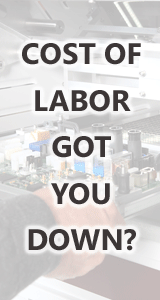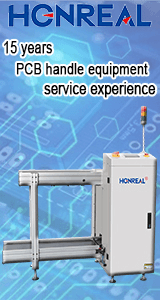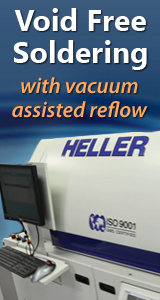Hi Dave,
To close-loop or not to close-loop, that is the question�
I can not speak for all machines, but in our case, close-loop systems are actually less costly to operate than open-loop systems (we make both).
First, determine the volume of water used in an open-loop cleaner. For instance, if the cleaner�s sump capacity is 2 gallons, and you run 1 wash cycle and six rinses, you can determine that for each batch of boards, you will need 14 gallons of DI water.
Secondly, do you have an existing DI water source? If not, you will most likely rent one from US Filter (or similar company) for an average cost of $ 70.00 per month, plus bottle exchanges. Here�s a formula based on a hypothetical requirement:
Water used per load of boards: 14 gallons Batches run per day: 10 Water used per day: 140 gallons Water used per month: 3010 gallons Quality of incoming tap water: 500 ppm Grain capacity of typical resin-based rental DI system: 30,000 grains Grains per gallon of tap water (ppm / 17.1): 29 grains per gallon Volume capacity of DI filter beds: 1,034 gallons (30,000 / 29)
Based on the above hypothetical, you will be replacing your DI tanks about 2 times per month. Most DI rental companies charge between $ 50.00 and $ 75.00 to exchange tanks. Lets call it $ 100.00 per month in tank exchanges plus $ 70.00 per month in rental charges. That�s $ 170.00 per month $ 2,040.00 annually) for DI water.
Now, lets compare a closed-loop system. A closed-loop batch cleaner excepts tap water on its initial fill (ours holds about 20 gallons). The closed-loop cleaner automatically de-ionizes the water and uses it over and over again to clean boards. When boards are being cleaned, two processes take place simultaneously. First, water is drawn from the sump tank and is directed onto the boards through the spray nozzles. Secondly, another pump draws water from the sump tank and directs it through a DI system. As the process water sprays onto the boards, it gets contaminated with flux and other contaminants. These contaminants are removed via the closed-loop DI system. Over the course of several minutes, the water in the sump becomes cleaner and cleaner, turning back into DI water.
When DI water is sprayed onto contaminated boards, it becomes dirty. Dirty DI water, however, is many times cleaner than �clean� tap water. It is far easier on a DI system to �clean-up� or re-de-ionize used DI water then it is to de-ionize tap water. This results in longer filter life. The average cost for a year�s worth of DI filters on a batch closed-loop system is $ 1,185.00 (about half the cost of an open-loop system).
As with all things in life, there are compromises.
Open-Loop System Pro�s: 1. Compatible with all flux types. 2. Compatible with water soluble solder masks.
Open-Loop System�s Con�s: 1. Drain = liability. 2. Uses more water. 3. Higher DI filter cost. 4. Longer cycle times.
Closed-Loop System�s Pro�s: 1. No drain = no liability. 2. Uses less water (only make up for evaporation). 3. Lower DI filter cost. 4. Shorter cycle times.
Closed-Loop System�s Con�s: 1. Inflexible applications (water soluble flux only, no water soluble mask).
I hope this helps!
This message was posted  the
Electronics Forum @
the
Electronics Forum @ 
reply »
![]() Has anyone looked at the economics of running a 2meg [min] D...
- Feb 14, 2002
by
davef
Has anyone looked at the economics of running a 2meg [min] D...
- Feb 14, 2002
by
davef
![]()
![]()
![]() The Electrovert AquaJet w/ Closed-Loop runs like $63K to $10...
- Feb 15, 2002
by
PeteC
The Electrovert AquaJet w/ Closed-Loop runs like $63K to $10...
- Feb 15, 2002
by
PeteC
![]()
![]()
![]() Hi Dave,
To close-loop or not to close-loop, that is the ...
- Feb 15, 2002
by
Hi Dave,
To close-loop or not to close-loop, that is the ...
- Feb 15, 2002
by
![]()
![]()
![]() Hello Dave,
With regards to acquiring data and additional...
- Feb 15, 2002
by
Sean D
Hello Dave,
With regards to acquiring data and additional...
- Feb 15, 2002
by
Sean D
![]()








